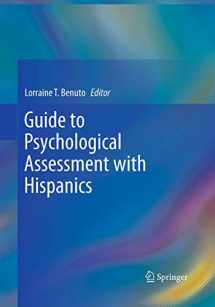
Guide to Psychological Assessment with Hispanics
Book details
Summary
Description
This book focuses on diversity, culture, and ethnicity as they relate to psychological assessment of Hispanics. It is a how-to guide for clinicians, researchers, and instructors working with Hispanic clients. Each chapter contains an overview of cultural considerations needed for assessing the Hispanic client followed by a specific exploration of the assessment measures available and the research that has been conducted on these measures with Hispanic participants. An exploration of the strengths and limitations of each assessment measure is included. Considering that ethnocultural minority individuals who are of Hispanic/Latino origin make up the largest ethnocultural minority group in the United States, guidelines for working with this population are a must. Given that a large subset of this percentage is composed of immigrants many of whom do not speak English or who have learned English as a second language, special considerations for effective psychological assessment are neccessary.This book fills a gap in the scientific literature by consolidating the research on psychological assessment with Hispanic samples into one comprehensive volume and providing simple recommendations for the psychological assessment of Hispanic clients. An exploration of the general psychological assessment domains (e.g., personality, intelligence) is included with references to research on the major assessment measures used in the field. A more specific exploration of psychodiagnostic assessment measures follows, including the assessment of mood disorders, anxiety disorders, sexual dysfunction, psychosis, etc. Several chapters are dedicated to specialized assessment, including neuropsychological assessment, forensic assessment, and school-based assessment, overall creating the most comprehensive, up-to-date, research-based compendium of psychological assessment measures for use with Hispanic clients.
From the Back Cover
A breakthrough moment in psychological assessment was the realization that one size does not fit all. Few populations prove this true as much as America’s largest ethnic minority: Hispanics, whose lives reflect a wide spectrum of cultural, language, and social factors. Traditionally, assessment has paid scant attention to such variables, but now clinicians are increasingly aware of linguistic and acculturation issues that can influence how psychological problems present―and that skewed test results can lead to misdiagnosis, inappropriate and ineffective treatment, and potentially devastating consequences.
The Guide to Psychological Assessment with Hispanics meets this evolving challenge by both outlining necessary cultural considerations and recommending specific measures for conducting assessment with Latino clients. This comprehensive resource describes salient test instruments in every major diagnostic area, and reviews current research on their use. Discussion covers the strengths and limitations of every measure featured, which span the range of assessment domains and specialties, including:
Intelligence. Personality. Eating, sleeping, sexual, and substance abuse disorders. Mood disorders and suicide risk. Child-specific and school-based measures. Neuropsychology, forensics, dementia, psychosis, malingering, and more.
As guidelines for therapy with Latino clients are coming into their own, culturally relevant assessment is of critical importance. Its depth of practical detail makes the Guide to Psychological Assessment with Hispanics an essential reference for clinical psychologists, clinical social workers, and neuropsychologists.


We would LOVE it if you could help us and other readers by reviewing the book
Book review



